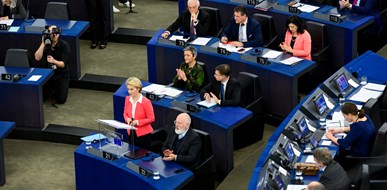[Interview] Brigid Laffan on the geo-political threats facing Europe: ‘The rest of the world is tired of our preaching’
Published 30 November 2021
@European Union, 2021
‘We Europeans have long thought that the rest of the world would become like us, if only we put enough carrots and sticks in front of the others. That more or less worked for years, because that's how we became one of the world's greatest economic powers. But now the rest of the world is tired of our preaching.’, says Prof. Brigid Laffan, speaker of the 7th Annual T.M.C. Asser Lecture on May 10, 2022, in an interview for Dutch quality newspaper NRC. ‘They want their standards to become dominant, instead of the Western ones. A different game is now being played. That of rock-hard, raw power play.
In an interview by journalist and EU watcher Caroline de Gruyter for Dutch quality paper NRC, Irish professor Brigid Laffan, one of the leading thinkers on European politics, analyses the current geo-political threats facing Europe. According to Laffan, ‘bold displays of power’ have, in world politics, replaced the policies that have made Europe influential: its open channels and multilateral relations. Examples are Belarus, pushing migrants into the EU. Or the UK, violating agreements on Northern Ireland and on a collision course with France over migrants and fishing licenses. And Russia, stoking fires in the EU, the Balkans and Ukraine.

Violent conflicts
Asked why Europe now finds itself surrounded by angry neighbours, Irish professor Laffan says: ‘What is happening here, reminds me of what the American political scientist George Modelski wrote in 1989: that there are long waves of about a hundred years, and at the end of these, global superpowers are trying to knock each other off the throne. The latter usually transforms the entire world. This period is often accompanied by violent conflicts. We seem to be in the middle of such a transformation. Each country is covering itself, adapting, trying to take advantage of it. Many of our neighbours are becoming more assertive and aggressive, using sharp power to weaken us. The big question is what does this do to Europe? Europe is a form of government, not a state. Will member states and citizens give Europe the power and resources to respond adequately to all the new challenges in the years ahead?’
Laffan believes that the way Europe conducts trade, with as many open channels and relationships with as many other countries as possible, is being challenged. Laffan: ‘All these open channels make us vulnerable. Look at the hassle with Belarus: it is not the EU that is closing the channel, but Minsk. It kicks and kicks against us in every way with the "sharp power" so peculiar to this period: you perforate your opponent, you penetrate his insides and hit him at his weakest point.’
‘We Europeans have long thought that the rest of the world would become like us, if only we put enough carrots and sticks in front of the others. That more or less worked, for years, because that's how we became one of the world's greatest economic powers. But now the rest of the world is tired of our preaching. They want their standards to become dominant, instead of the Western ones. A different game is now being played. That of rock-hard, raw power play.’
Player or plaything?
Asked if Europe will become a player, or a plaything – the title of the 7th Annual T.M.C. Asser Lecture – Laffan says that she does not know the answer yet. “Europe has usually come out of crises stronger so far. I am not so afraid that things will collapse. At the same time: the whole world constellation is shifting enormously. The risk of Europe getting caught up in events like the one we are now witnessing with Belarus, which could easily get out of hand, is increasing.’
‘If the US is indeed losing global hegemony to China, Europe has a big problem. The EU has long been a normative power. And the US is closer to us than China, in terms of norms. The EU is a large and strong trading bloc that can dictate its standards even on the other side of the world. Our strict data protection rules, regulations on chemicals, and protection against child labour are applied worldwide, otherwise producers will not enter our market. Ian Manners, a scholar who studies the normative power of the EU, once said, "Europe defines what is normal in the world. But that is going to pass. Because the way Europe conducts trade, with as many open channels and relationships with as many other countries as possible, is going to be challenged.’
Laffan believes that the EU has learned a lot from many of the recent crises, - the financial crisis, the Euro crisis, the Brexit and the Covid pandemic. She thinks that the question is not whether the 27 member states will stay together, but whether they will manage to formulate the right response to the new, sharp threats from autocracies: ‘So this is about foreign policy. About security. Europe has not been about that until now, because it wasn’t necessary. Well, now it is necessary. Member states cannot do it alone. So we are working on doing it at European level. Are we managing to join forces there? Can we answer sharply enough? Even if the will is there, it will not be easy.’
Read the full article (in Dutch).
Read more about the Annual T.M.C. Asser Lecture by Brigid Laffan (May 10, 2022).
Sign up for the Annual T.M.C. Asser Lecture.
